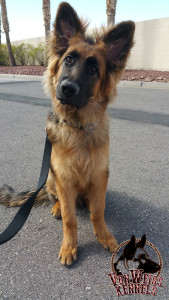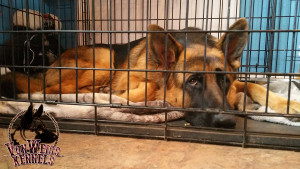Now that you have brought your new German Shepherd puppy home, there are 5 things you must remember to follow through with to help acclimate your German Shepherd Puppies new surroundings.
#5 Understand Your German Shepherd Puppy
Understand your German Shepherd puppy might be frightened and timid when they get home. They have been taken away from their mother and litter-mates and all of their familiar surroundings. It is now your now your job to build up trust and a relationship with your new German Shepherd. What you do now, will imprint your German Shepherds mind to trust you or not. Never force your puppy to come to you. Always lead your puppy to want to come to you by using a toy to play with your German Shepherd, positive voice calling, or a food they like. This will start to build up trust and a bond. If you try to “manhandle’ your puppy, they will not be likely want to please you and run from you or grow timid. Remember, your German Shepherd Puppy is a blank slate and what you teach them now, will be in the back of their mind forever.

#4 Create Boundaries
German Shepherd Puppies need to have boundaries and taught what they are allowed to do and not do. German Shepherds need to have a playpen and a crate to control your puppy’s activities. Without either one of these training tools, your puppy will be running around the house in chaos and not be aware of what they are allowed to do and not do. That leads to frustration, anger and yelling at your puppy. When this happens, it will hurt your bond with your new German Shepherd Puppy and you will be off to a bad start.
You are the pack leader, therefore you teach your puppy boundaries. This does not mean yell at your puppy when he does something wrong. Your German Shepherd Puppy has NO clue what is right and wrong yet until you teach him. To start, use a puppy playpen. This way, your puppy is not learning bad behaviors such as chewing on the couch or eating shoes and electrical cords. Have plenty of toys in your German Shepherds playpen and change them every few days to get your German Shepherd used to different things, textures and sounds. When you are ready to bring your German Shepherd puppy out with you, make sure he has your FULL attention. Do not let puppy run around without you observing and training.
#3 Crate Training
Once again, your German Shepherd needs boundaries. When you are sleeping at night, the last thing you want is for your German Shepherd puppy to be able to run loose either in your room or in your house unattended. This is very dangerous for a puppy and you might wake up to a hurt or even worse, German Shepherd puppy. Crate training at night is for safety and to put your puppy on a schedule. Do not force your puppy into the crate at first. Feed your German Shepherd puppy in his crate, have toys in their crate and a blanket. This is the puppy’s personal bedroom and he needs to feel comfortable in it. The first night home, after you have introduced your puppy to their crate, your German Shepherd puppy will mostly cry and yelp and scream for the first few hours.DO NOT GIVE IN TO THE CUTENESS! You can lay down b the side of your German Shepherd puppies crate and comfort them, but do not let them out no matter how sorry you feel for them. They will learn over the next few days, this is where they eat and sleep.

#2 Potty Training
The crate is also the best tool to teach your German Shepherd how and when to “make” in a designated area. First thing in the morning you are to let puppy out of their crate, pick up your puppy and bring them to their potty area. Do not let the puppy walk there for the first few days. Once you see you puppy “making”, give a high praise with a high tone of voice. But don’t do it so loud that you scare them into stopping what they were doing! Once your German Shepherd puppy is finished, put your puppy back into their crate and feed them. About 5 minutes after they are done, bring puppy back to the designated area and let them go again. This time it may take a while. In a two or three days you will be able to figure the time it takes your puppy to “make” and you can adjust your timing.
Once puppy is all done with potty training and eating, it is time to do a little socializing with your new German Shepherd puppy. Play with your puppy, run with your puppy and keep a positive attitude! Then, put them in their puppy pen when you cannot be with them full time.
#1 Keeping Puppy Safe
All German Shepherd puppies need three sets of shots to protect them from Parvo, distemper and rabies. A puppy is NEVER to go to dog parks, allowed to dig and hang out in the backyard or go into public areas until they have had all three sets of shots. This, without a doubt, is one of the biggest killers of German Shepherd puppies, lack of knowledge. Until two days after the puppies shots are complete, keep your puppy secure and safe by keeping them in the house and monitored while they go “make”. It will save your puppies life.
As well, when you are at the vet, hold your puppy at all times. Do not let your puppy down on the floor. People constantly bring in sick dogs and the vet may not be aware of a dog that has Parvo or distemper that is waiting to be seen.
